Kim Jong Un and Ri Sol Ju Visit China
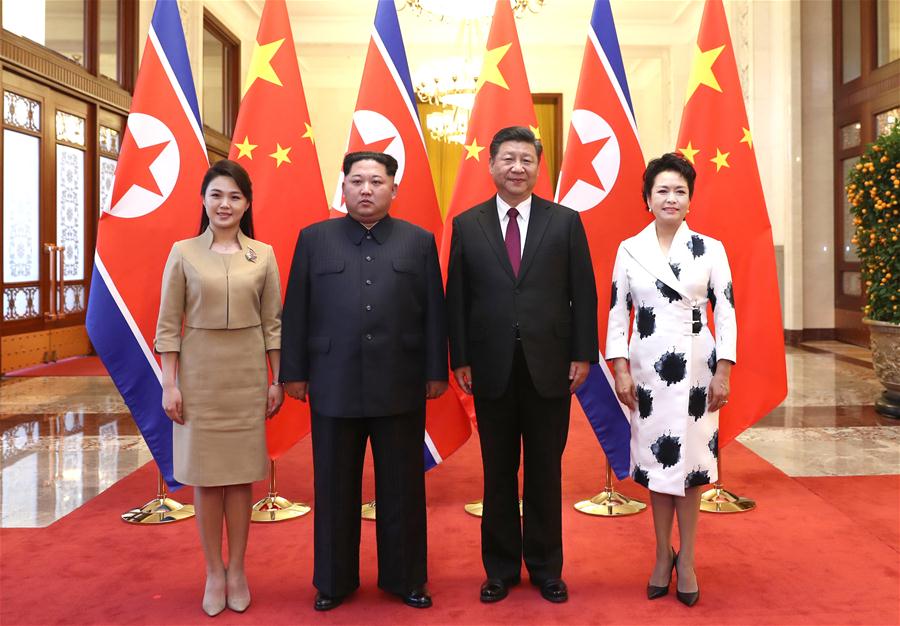
Kim Jong Un, Ri Sol Ju, Xi Jinping and Peng Liyuan pose for a commemorative photograph in Beijing on March 26, 2018 (Photo: Xinhua News Service).
KJU’s last observed appearance was his meeting with a senior ROK delegation representing Moon Jae-in in the central party complex on March 5
Kim Jong Un [Kim Cho’ng-u’n] and his wife Ri Sol Ju [Ri So’l-chu] visited China during March 25 [Sunday] and March 28 [Wednesday]. Among the members of KJU’s travel party were: Workers’ Party of Korea [WPK] Vice Chairman, State Affairs Commission Vice Chairman and WPK Organization Guidance Department Director Choe Ryong Hae [Ch’oe Ryong-hae]; WPK Vice Chairman and WPK Propaganda and Agitation Department Director Pak Kwang Ho [Pak Kwang-ho]; WPK Vice Chairman and WPK International Affairs Department Director Ri Su Yong [Ri Su-yo’ng]; WPK Vice Chairman and WPK United Front Department Director Kim Yong Chol [Kim Yo’ng-ch’o’l]; DPRK Foreign Minister Ri Yong Ho [Ri Yo’ng-ho]; Personal Secretariat Deputy Chief and WPK Organization Guidance Department Deputy Director Jo Yong Won [Cho Yo’ng-wo’n]; WPK International Affairs Department Deputy Director Kim Song Nam [Kim So’ng-nam]; and, Rodong Sinmun editor and WPK Propaganda and Agitation Department Deputy Director Kim Pyong Ho [Kim Pyo’ng-ho].
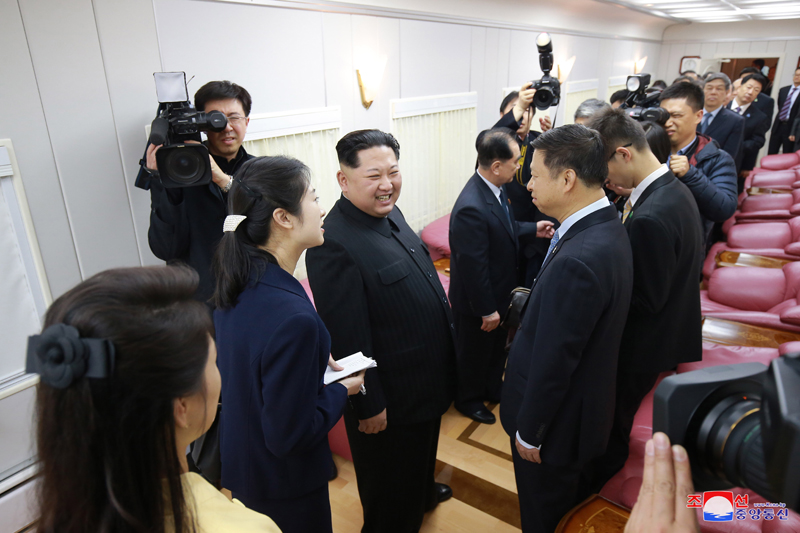
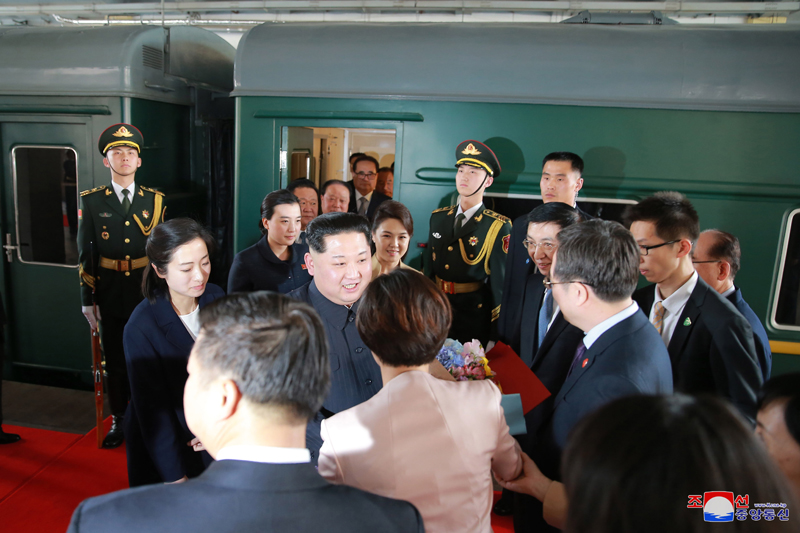
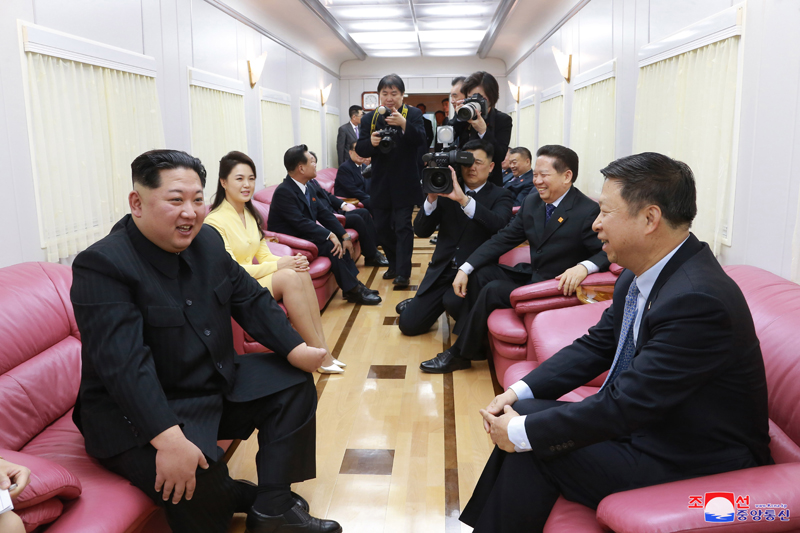
After Jong Un’s train crossed the DPRK-PRC border via Sinu’iju, it was met in Dandong by Communist Party of China [CPC] International Liaison Department Director Song Tao and other provincial and central CPC and PRC Government officials. Jong Un “expressed thanks to Song Tao and his party for greeting him at the border city far away from Beijing” and Song “warmly welcomed Kim Jong Un and his wife Ri Sol Ju’s visit to China, noting that he came from Beijing upon the authorization of Xi Jinping.”
KJU arrived in Beijing on March 26 [Monday]. He was greeted by Wang Huning, Ding Xuexiang, Song Tao, General Manager of Chinese Railway Corporation Lu Dongfu and PRC Ambassador to the DPRK Li Jinjun. Jong Un “exchanged greetings” with the CPC and Chinese Government officials. He and his travel party were then ferried to the Diaoyutai Guest House and Great Hall of the People, under the escort of 21 motorcycles.
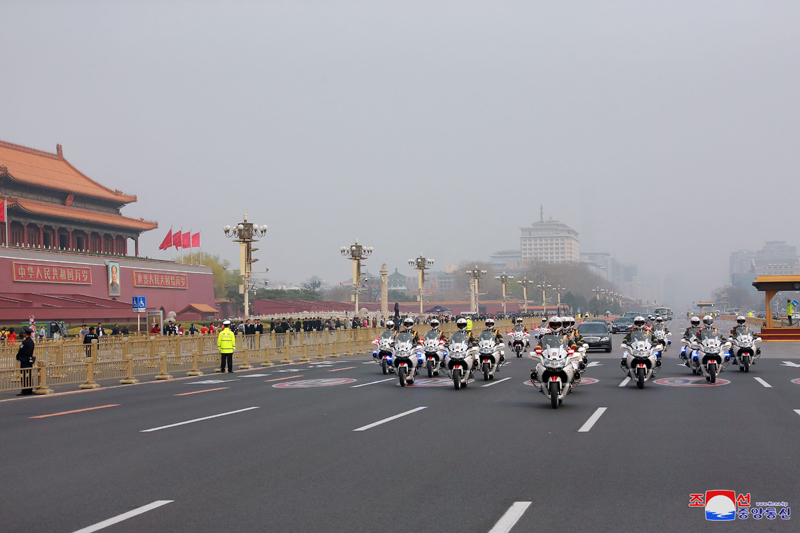
A welcome ceremony was held at the Great Hall of the People. Kim Jong Un and Ri Sol Ju were “warmly greeted” by Xi Jinping and his wife Peng Liyuan. President Xi “warmly welcomed Kim Jong Un’s maiden foreign visit to China” and Jong Un “expressed deep thanks for Xi Jinping’s warm care and hospitality for his visit.” Ri Sol Ju, Peng Liyuan, KJU and Xi Jinping then posed for commemorative photographs, after which Kim Jong Un greeted senior PRC officials. Then Xi and Jong Un stood as the the PRC and DPRK national anthems were played, after which Kim Jong Un received a salute and reviewed a People’s Liberation Army [PLA] honor guard, escorted by President Xi.
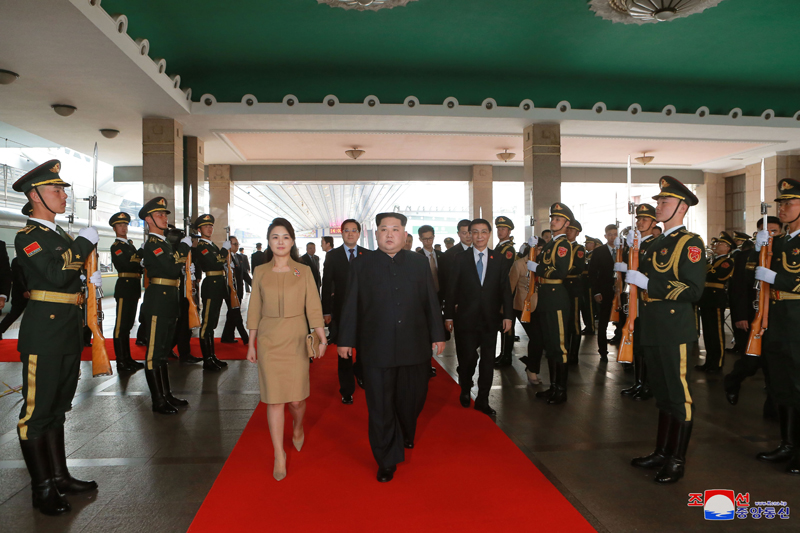
Kim Jong Un and Xi Jinping held a meeting on March 26 (Monday). Attending the Kim-Xi high-level interaction from the DPRK side were Ri Su Yong, Kim Yong Chol and Ri Yong Ho. According to KCNA, they “exchanged views on important matters including the development of DPRK-China friendly relations and the issue of handling the situation of the Korean peninsula.” Jong Un remarked that he “was pleased to have the first significant meeting with Xi Jinping” and that it “is the fixed determination of the Workers’ Party of Korea and the government of the DPRK to carry forward the precious tradition of the DPRK-China friendship, provided and strengthened by the leaders of the elder generations of the two countries, and put it on a new high stage as required by the developing era.”
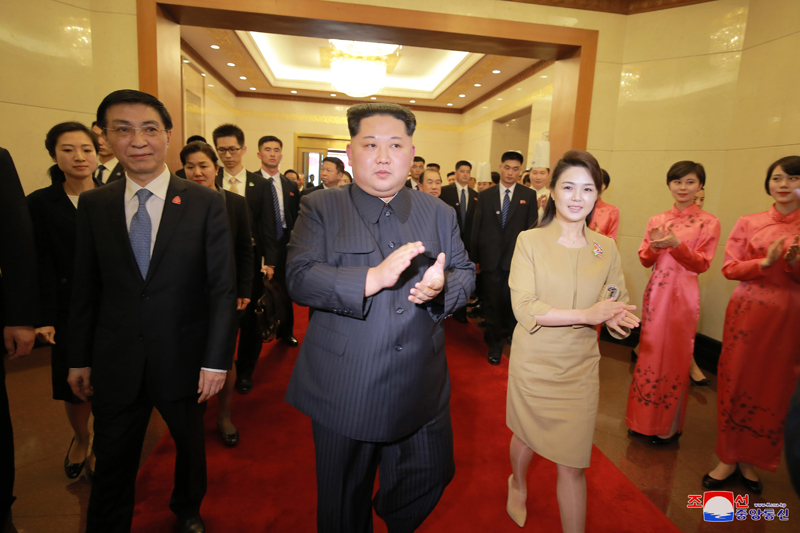
Jong Un “talked about the need to meet with the Chinese comrades often, including Xi Jinping, to fruther deepen friendship and strengthen the strategic communication and strategic and tactical cooperation so as to consolidate the unity and cooperation between the two countries.” He also voiced his “expectation that the Chinese people would achieve shining successes in the cause of building a modern and powerful socialist country in the new era and in the struggle to realize China’s dream of the great prosperity of the Chinese nation under the correct leadership of Xi Jinping at the core.”
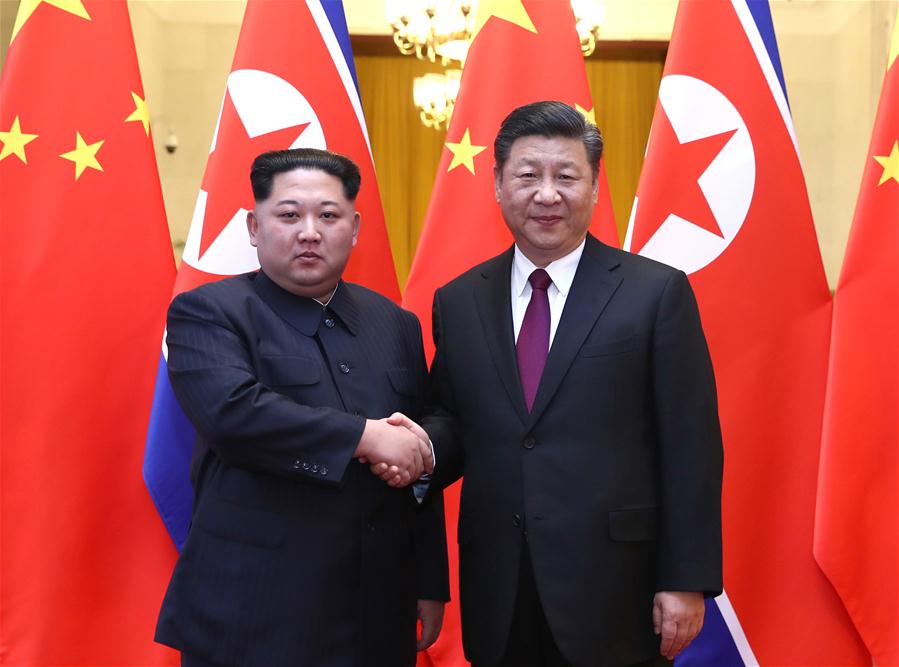
Xi Jinping, according to KCNA, “warmly welcomed Kim Jong Un for visiting China as his maiden foreign trip” and stressed that “it is the strategic option and unshakeable will of the Chinese party and government to attach importance to and steadily carry forward and develop the Sin-DPRK friendship which the leaders of elder generations personally provided and nurtured with sincerity in the course of contributing to the victorious advance of the socialist cause, out of the common ideal, faith and deep revolutionary friendship. The recent positive change observed in the situation on the Korean peninsula is a fruition of a strategic decision by Kim Jong Un and the efforts exerted by the party and government of the DPRK.”
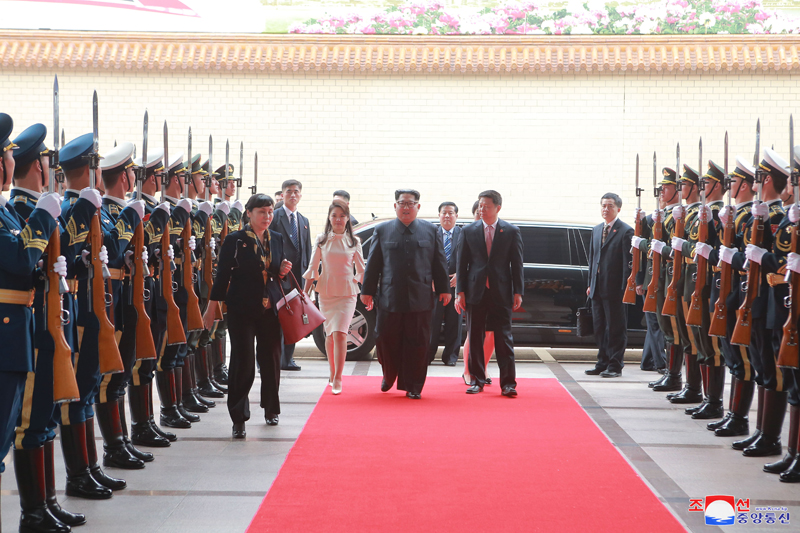
Xi “expressed the conviction that under the leadership of Kim Jong Un, the Workers’ Party of Korea would register fresh successes in steadily advancing along the socialist path, developing the economy and improving the standard of people’s living by guiding the Korean people.” Kim Jong Un invited President Xi to visit the DPRK “at a convenient time” and Xi accepted the invitation “with pleasure.”
According to Xinhua, Xi Jinping “expressed warm welcome on behalf of the CPC Central Committee to Kim for his first visit to China”appreciated that Kim sent him a congratulatory message after the 19th CPC National Congress on his re-election as general secretary of the CPC Central Committee and the assumption of office of chairman of the CPC Central Military Commission (CMC).” President Xi was “also grateful to Kim for congratulating him again several days ago immediately after he was re-elected China’s president and chairman of the CMC of the country.”
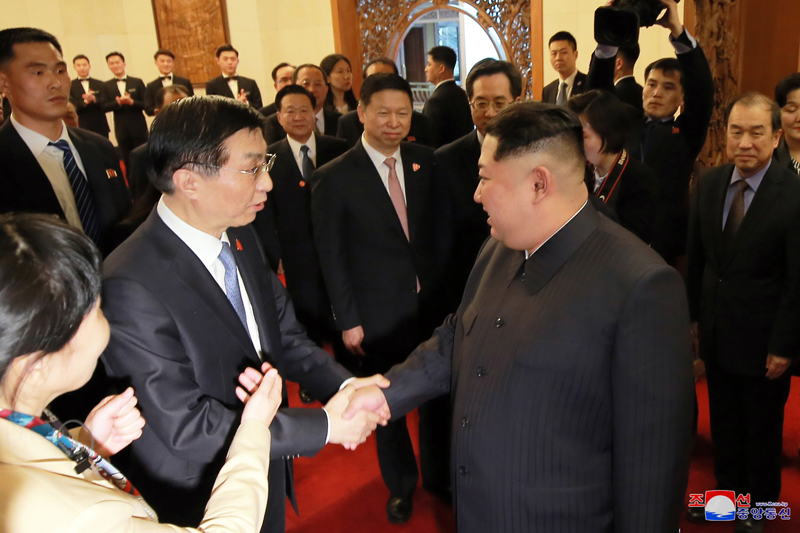
President Xi said that Jong Un’s “current visit to China, which came at a special time and was of great significance, fully embodied the great importance that Comrade Chairman and the WPK Central Committee have attached to the relations between the two countries and the two parties.” He told KJU that “we speak highly of this visit.”
Kim Jong Un, according to Xinhua said that “a series of major and happy events have taken place consecutively in China recently, as the 19th CPC National Congress was held victoriously last year, and the annual sessions of the National People’s Congress and the National Committee of the Chinese People’s Political Consultative Conference were successfully held not long ago” and that “Comrade Xi Jinping enjoyed the support of the CPC and the people of the whole country, became the core of the leadership and was re-elected Chinese president and CMC chairman.” Jong Un said that “it is my obligation to come to congratulate Xi in person, in line with the DPRK-China friendly tradition. At present, the Korean Peninsula situation is developing rapidly and many important changes have taken place. I felt I should come in time to inform Comrade General Secretary Xi Jinping in person the situation out of comradeship and moral responsibility.”
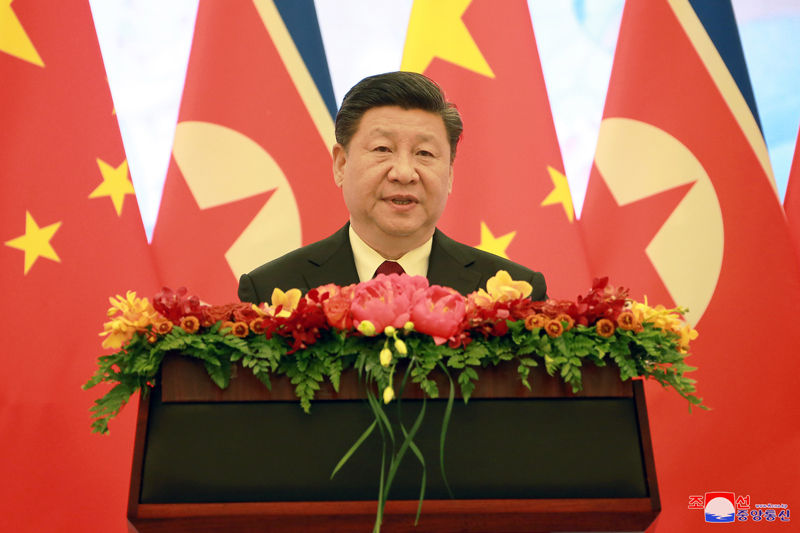
Xi Jinping said that the “China-DPRK traditional friendship, established and cultivated meticulously by the elder generations of leaders of both parties and both countries, was the precious wealth of both sides. Sharing common ideals and beliefs as well as profound revolutionary friendship, the elder generations of leaders of the two countries trusted and supported each other, and wrote a fine story in the history of international relations. Several generations of the leaders of China and the DPRK have maintained close exchanges and paid frequent calls on each other like relatives. The two parties and countries have supported each other and coordinated with each other during long-term practices, making great contributions to the development of the socialist cause.”
President Xi also remarked that “both Comrade Chairman and I have personally experienced and witnessed the development of China-DPRK relationship,” and he added that “both sides have stated repeatedly that traditional China-DPRK friendship should be passed on continuously and developed better. This is a strategic choice and the only right choice both sides have made based on history and reality, the international and regional structure and the general situation of China-DPRK ties. This should not and will not change because of any single event at a particular time.”
Xi Jinping stressed that the “CPC and the Chinese government highly value China-DPRK friendly cooperative ties. It is an unswerving principle of the CPC and the Chinese government to maintain, consolidate and develop good relations with the DPRK. We are willing to work together with DPRK comrades, remain true to our original aspiration and jointly move forward, to promote long-term healthy and stable development of China-DPRK relations, benefit the two countries and two peoples, and make new contribution to regional peace, stability and development.”
Xi made four proposals on DPRK-PRC relations:
Firstly, continue giving play to the guiding role of high-level exchanges. High-level exchanges have always played the most important guiding and promoting role in the history of China-DPRK relations. Under the new circumstances, I am willing to keep frequent contacts with Comrade Chairman through various forms such as exchange of visits, and sending special envoys and letters to each other.
Secondly, make full play of the time-tested valuable practices of strategic communication. It is the splendid tradition of the two parties to have frequent in-depth exchange of views on major issues. Both sides should maximize the important role of party-to-party exchanges, promote exchanges and cooperation between the two countries in various areas, and strengthen communication and mutual trust.
Thirdly, actively advance peaceful development. Socialism with Chinese characteristics has entered a new era, and the DPRK’s socialist construction has also ushered in a new historical period. We are ready to make joint efforts with the DPRK side, conform to the trend of the times, hold high the banner of peace, development, cooperation and mutual benefit, continuously improve the wellbeing of the two peoples, and make positive contribution to regional peace, stability and development.
Fourthly, cement the popular will foundation for China-DPRK friendship. The two sides should, through various forms, enhance people-to-people exchanges, consolidate the foundation of popular will for bilateral friendly relations, especially enhance youth exchanges, inherit and carry forward the fine tradition of China-DPRK friendship.
Kim Jong Un replied to these proposals by saying he “was greatly encouraged and inspired by General Secretary Xi’s important views on DPRK-China friendship and the development of relations between the two parties and countries. The DPRK-China friendship, which was founded and nurtured by the elder generations of leaders of both countries, is unshakable, he said. It is a strategic choice of the DPRK to pass on and develop friendship with China under the new situation, and it will remain unchanged under any circumstances.”
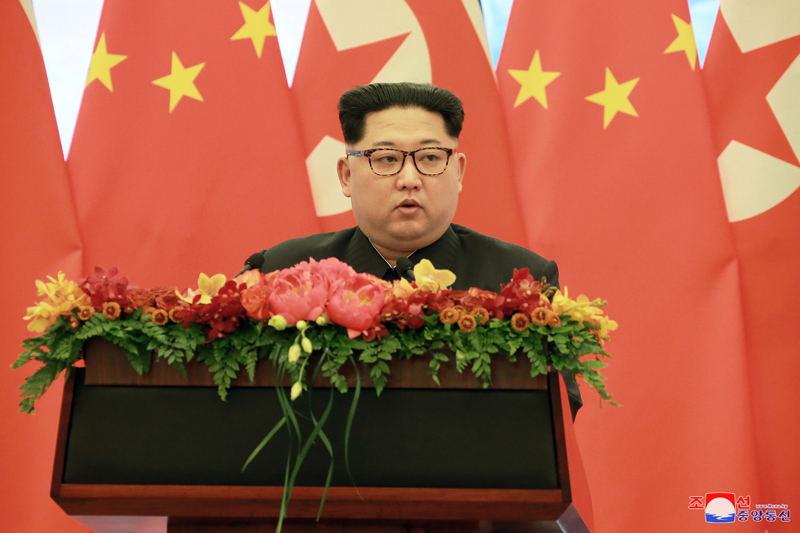
Jong Un said that “his current visit aims to meet Chinese comrades, enhance strategic communication, and deepen traditional friendship, hoping to have opportunities to meet with Comrade General Secretary Xi Jinping often, and keep close contacts through such forms as sending special envoys and personal letters to each other, so as to promote to a new level the guidance of high-level meetings to the relations between the two parties and countries.”
KJU and President Xi “informed each other of their respective domestic situation.” Xi said that the “19th CPC National Congress had drawn a grand blueprint for building China into a great modern socialist country in all respects — building a moderately prosperous society in all respects by 2020, having basically achieved modernization by 2035 and building a great modern socialist country that is prosperous, strong, democratic, culturally advanced, harmonious, and beautiful by the middle of the century. The CPC will lead the Chinese people of all ethnic groups in keeping on working with great determination and continuously striving for the realization of the Chinese Dream of national rejuvenation.”
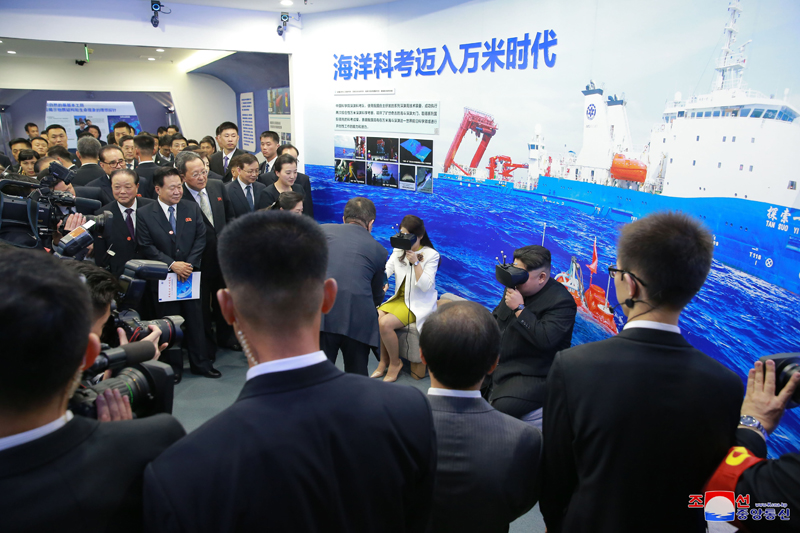
Xi also said that “we have noticed that Comrade Chairman has led the WPK and the people of the DPRK in taking a series of active measures and scoring achievements in developing economy and improving people’s wellbeing in recent years” and that the “Chinese side expects political stability, economic development and people’s happiness in the DPRK, and supports the WPK, led by Comrade Chairman, in leading the people of the DPRK to advance along the path of socialism, as well as the endeavors by comrades of the DPRK in developing economy and improving people’s livelihood.”
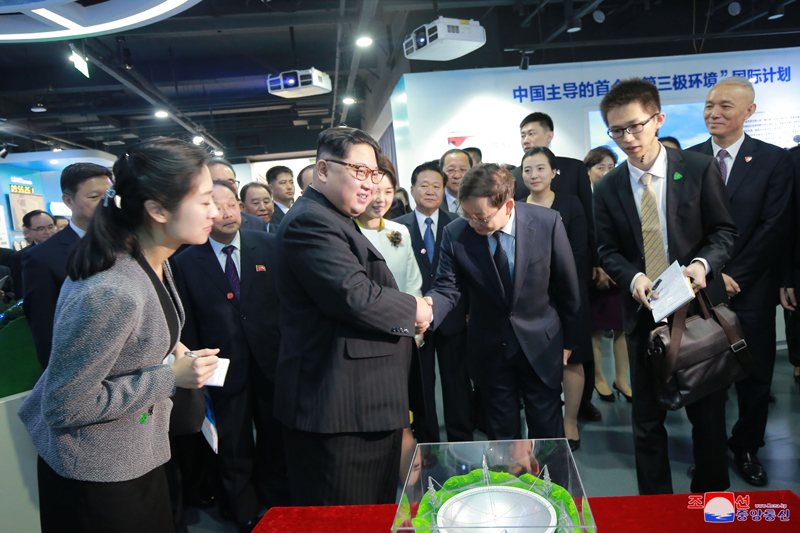
Kim Jong Un said that “since the 18th CPC National Congress, the CPC Central Committee with Comrade Xi Jinping at the core has, with tremendous political courage and a strong sense of responsibility, developed new thinking and new ideas, put them into action, and solved many tough problems that were never resolved and accomplished many big things that were long on the agenda but never got done. These achievements fully proved that the lines of the CPC are correct lines that accord with the national conditions. In particular, Comrade General Secretary has put forward the requirements that the Party should exercise effective self-supervision and practice strict self-governance in every respect, which has contributed greatly to Party building and realized the overall Party leadership over all work. At present, the WPK is also intensifying its efforts in fighting against arrogance, bureaucracy and corruption.”
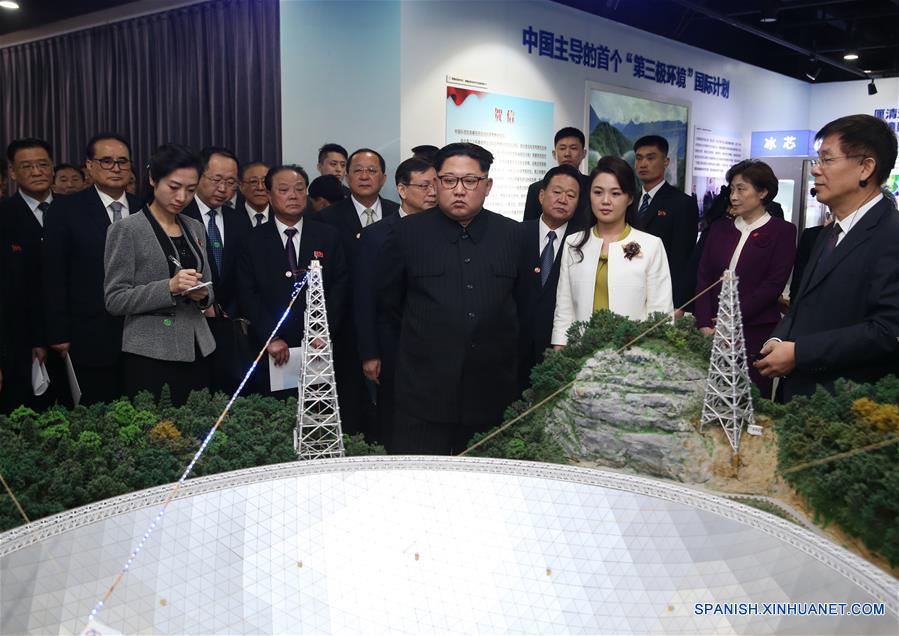
Jong Un also remarked that he “sincerely hoped that China will continuously make new great achievements in the course of building a moderately prosperous society in all respects and a great modern socialist country.”
Xi and Jong Un “thoroughly exchanged views on the situation of the world and the Korean Peninsula” and Xi said that “positive changes had taken place on the Korean Peninsula since this year, and China appreciates the important efforts made by the DPRK. China sticks to the goal of denuclearization of the peninsula, safeguarding peace and stability on the peninsula and solving problems through dialogue and consultation. China calls on all parties to support the improvement of inter-Korean ties, and take concrete efforts to facilitate peace talks” and he noted that “China will continue to play constructive role on the issue and work with all parties, including the DPRK, toward the thaw of the situation on the peninsula.”
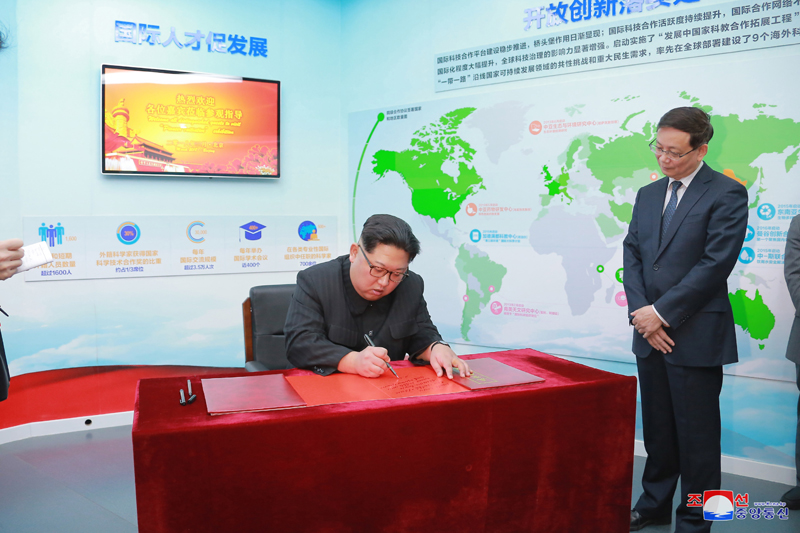
Kim Jong Un said that “the situation on the Korean Peninsula is starting to get better, as the DPRK has taken the initiative to ease tensions and put forward proposals for peace talks. It is our consistent stand to be committed to denuclearization on the peninsula, in accordance with the will of late President Kim Il Sung [Kim Il-so’ng] and late General Secretary Kim Jong Il [Kim Cho’ng-il].” He said that the “DPRK is determined to transform the inter-Korean ties into a relationship of reconciliation and cooperation and hold summit between the heads of the two sides. The DPRK is willing to have dialogue with the United States and hold a summit of the two countries. The issue of denuclearization of the Korean Peninsula can be resolved, if south Korea and the United States respond to our efforts with goodwill, create an atmosphere of peace and stability while taking progressive and synchronous measures for the realization of peace. The DPRK hopes to enhance strategic communication with China during the process, jointly safeguard the trend of consultation and dialogue as well as peace and stability on the peninsula.”
After the meeting, Xi Jinping and Peng Liyuan presents gifts to Kim Jong Un and Ri Sol Ju. A banquet was also held. It began with the showing of a film “on the activities of the leaders of the two parties and two countries who provided and nurtured the roots of the DPRK-China friendship.” Xi Jinping delivered a congratulatory speech, followed by a response by Kim Jong Un. According to DPRK state media, the “banquet proceeded in a comradely, fraternal and amicable atmosphere.” An art performance was given by Chinese performers. Kim Jong Un and Ri Sol Ju had a flower basket given to the performers “who showed hospitality through the excellent performance” and took the stage with Xi and Peng to have commemorative photos taken with the performers.
On March 27 (Tuesday) Kim Jong Un toured an exhibition of the Chinese Academy of Sciences to mark the 18th CPC Congress. Jong Un and members of the DPRK travel party walked around the exhibition “being briefed on the successes made in the field of natural science and technology, such as nuclear physics, outer space, agriculture and energy.” Jong Un made an entry in the guestbook which said that “we can grasp the mightiness of China, a great neighboring country. More excellent successes will achieved under the wise leadership of the Communist Party of China.”
After the exhibition tour, Kim Jong Un, Ri Sol Ju and senior DPRK officials attended a send-off lunch hosted by Xi Jinping and Peng Liyuan. After lunch, Jong Un “exchanged good-byes” with Xi. Jong Un, Ri Sol Ju and the senior DPRK officials departed Beijing on the VIP train during the afternoon of March 27. They were accompanied through Dandong Railway Station by Song Tao, Lu Dongfu and Li Jinjun. Whilst departing Dandong, Kim Jong Un wrote a thank-you note to Xi Jinping “for having accorded cordial hospitality with utmost sincerity to him in token of warm comradely friendship and friendly feelings during his China visit.”